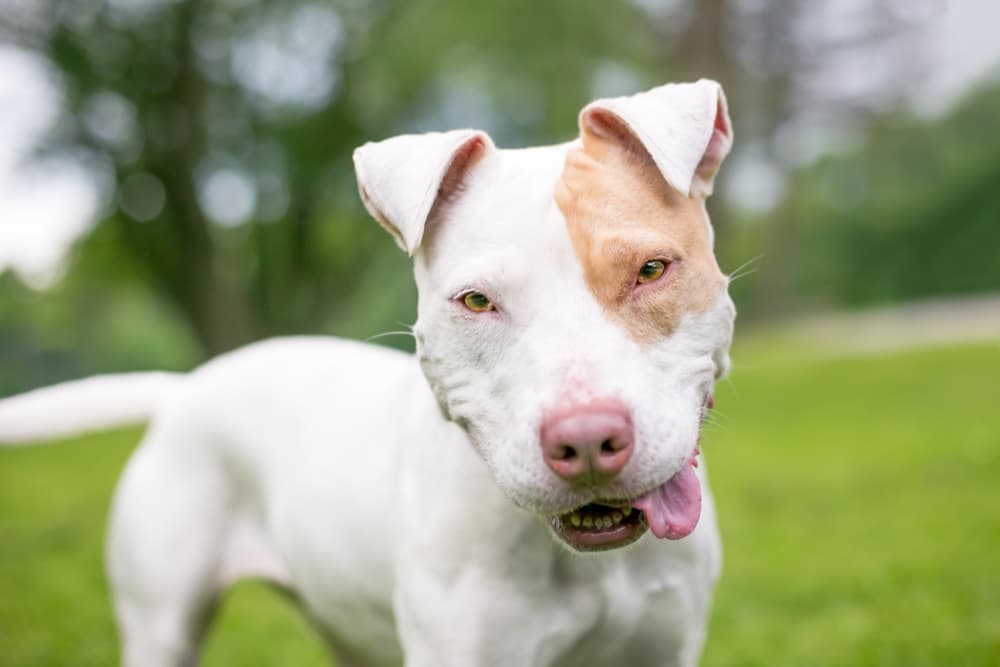Like sick people, sick dogs also need to eat wholesome meals to regain their energy. The right diet will also impact their general health and well-being. But the question is, “what to feed a sick dog?”.
It’s crucial that what you feed your sick dog won’t make their condition worse because you’re a pet parent. You are in the right place if you are unsure of the food you can prepare.
The list of foods your dog can eat if they’re feeling under the weather is provided below.
Rice and chicken are two of the primary components in dog food. They are perfect for dogs with upset stomachs.
For this recipe, you’ll need skinless, boneless chicken breast and white rice. Despite having less nutritional value than brown rice, white rice’s blandness makes it a good choice for an upset stomach.
A dog’s stomach may become irritated by butter, oils, and additional seasonings, making them feel even more ill. Feed rice and plain boiled chicken to your sick dog. Also, make sure to cook the chicken thoroughly. Better yet, shred or cut it into bite-sized pieces.
For intestinal issues, it’s a good idea to feed your dog sweet potatoes. However, avoid giving your dog raw sweet potatoes as they may upset their stomach or result in intestinal blockage.
Cook sweet potatoes thoroughly. For your sick pet, you can also remove the skin or prepare sweet potato dishes like mashed potatoes. Sweet potatoes are a good source of fiber and other necessary vitamins that improve your dog’s health.
Due to their high fiber content, pumpkins can be used to treat canine diarrhea. It settles your dog’s stomach and solidifies its stool.
However, a pumpkin is a prebiotic that naturally increases the good bacteria in the stomach. Pumpkin reduces gastrointestinal symptoms in dogs, calms an upset stomach, and makes them feel better.
Make sure not to overdose your dog’s food with pumpkin. The increased fiber can cause constipation. Therefore, it’s best to begin with a small amount and then gradually increase it. Additionally, you must use pumpkin without the skin or seeds.
If pumpkin is not available, Nancy Lee, owner of the Cooky Mom website, advises feeding your dog butternut squash instead. The squash can help if your dog has diarrhea.
However, be cautious not to overfeed your pet as this could make your dog’s condition worse.
There is a misconception that turkey is bad for dogs. But the truth is, this food is straightforward to digest. Additionally, it is typically given to dogs who have diarrhea and vomiting along with white rice. If the turkey is boiled, baked, and cooked without seasonings or fats, it is safe to give.
Cooked turkey bones, skin, and greasy drippings should never be given to dogs because they are unhealthy.
Bone broth is always a good choice if you want to give your sick dog a bland diet. A mild liquid meal like bone broth can calm an upset stomach. Additionally, it’s a tasty and wholesome way to add flavor and moisture to dry food. If your pet has a poor appetite, it will encourage them to eat.
Nevertheless, this food is straightforward to prepare. Put numerous joints of bones in a pot, such as chicken legs, turkey legs, or beef marrow bones. Then add water that is enough to cover the bones.
Cook on low for 20 to 24 hours. Additionally, stay away from adding black pepper to your dog’s food when making bone broth as it may cause issues like hemorrhoids and a burning sensation in the stomach.
So that the fat at the top hardens, let the bone broth cool in the refrigerator for two to three hours. Remove the fat, then refrigerate the jelly-like broth. Then, if you want to use the broth, reheat it in the microwave, being careful not to let it get too hot as this could burn your dog’s mouth.
Despite the fact that bone broth is healthy, cooked bones are harmful to your dog. Therefore, before serving, make sure the broth is bone-free.
A sick dog can benefit greatly from eating baby food as well. The dog’s sense of smell will stimulate their appetite. It is also easy to keep down and ingest.
You can purchase this food in a pouch or jar at your neighborhood supermarket. However, given that it is high in fats and carbohydrates, it can increase your pet’s appetite. Additionally, it raises the possibility that your pet will develop a picky eating habit as soon as they recover.
You should choose baby food without onions and garlic because they can be extremely dangerous if you want to ensure safety.
Giving sick dogs wet food when they have a decreased appetite is one of the best ways to get them to eat. Usually, this can smell more appetizing to dogs, especially if you briefly reheat the food in the microwave. Wet or canned food is readily available in the market.
Although wet food is typically nutritious, it is typically recommended for pets to recover from dental pain or anxiety. Dogs can quickly and easily consume them. This will lessen discomfort and facilitate eating for a anxious dog.
Fish has a distinct smell that dogs find enticing and can even tempt sick dogs to eat. But make sure to serve cooked fish because raw fish can hurt people.
To help your sick animal friend eat more, try boiling deboned fish and giving it to them. Additionally soft, the food is perfect for people with issues with their teeth or jaw. Dogs with depression and anxiety who don’t want to eat can also eat fish.
Last but not least, feeding your dog a small amount of this food can stimulate their appetite if they have an upset stomach. However, be careful not to give too much as this could further upset the stomach.
Can Dogs Have Chicken Broth?

In short, yes—chicken broth is a generally safe addition to make to your dog’s diet. “I routinely recommend chicken broth as a palatability enhancer for dogs with picky appetites,” says Dr. Valerie Parker, a board-certified veterinary nutritionist and associate professor of clinical small animal internal medicine and nutrition in the Department of Veterinary Clinical Sciences at Ohio State University in Columbus, Ohio.
However, before giving your dog any old store-bought chicken broth, be sure to read the label. Many broths include extra ingredients like onion and garlic, which can both be toxic to dogs, according to Dr Deborah E. Linder, a board-certified veterinary nutritionist and research assistant professor of clinical nutrition at Tufts University in Grafton, Massachusetts’s Cummings School of Veterinary Medicine
Beyond this, she adds, even low-sodium broths can contain a lot of sodium, which may be harmful depending on the particular dietary requirements of your dog.
Before adding chicken broth to your dog’s food, as with any time you alter his diet, be sure to consult your veterinarian, especially if he has a preexisting medical condition like diabetes, cancer, or heart disease.
Can Dogs Have Chicken Bone Broth?

Rich in nutrients and collagen, a building block of muscles and joints, bone broth is all the rage these days (1). But how does chicken bone broth for dogs compare to typical chicken broth?
The same guidelines apply when you’re reading the label, even though Parker points out that there are no studies evaluating the use of chicken bone broth in dogs’ diets. If you’re watching your dog’s salt intake, stay away from chicken bone broths that have added aromatics like garlic and onion and choose a low-sodium or homemade bone broth instead.
How to Make Chicken Broth for Dogs

Making your own chicken broth might be preferable if you don’t have any on hand. According to Parker, homemade chicken broth is suitable for dogs and occasionally the simplest way to locate a broth devoid of onion and garlic.
Here are steps to prepare homemade chicken broth for dogs:
The first step, according to Linder, is to boil chicken meat in plain water without any seasoning.
Step 2: Reduce the heat and let it simmer, uncovered, for three to four hours. If necessary, skim any foam from the top.
Step 3: Strain the liquid to remove all chicken meat. Allow it to cool to a safe warm-but-not-hot temperature.
Step 4: Pour some over your dog’s food once it reaches the proper temperature.
While chicken and rice is yet another well-liked at-home treatment for dogs who are ill or have lost their appetite, Parker warns that this almost always leads to an unbalanced diet. Again, if your dog isn’t feeling well, it’s best to speak with your veterinarian before making any significant dietary changes.
FAQ
How much chicken broth do you give a sick dog?
Portion according to your dog’s size. You can give your dog either chicken broth or dry food. Dogs can eat one ounce of bone broth per every ten pounds of body weight as a standard serving. In order to freeze the mixture into dog treats, you can also pour the chicken stock into ice cube trays.
Is chicken stock good for a sick dog?
When supplementing your dog’s diet on a regular or short-term basis, chicken broth can be a beneficial addition. It can support healthy joints, picky eating, dehydration, diarrhea, upset stomach, and many other conditions.
Is broth good for sick dogs?
Bone broth is a very mild, liquid meal that dogs’ upset stomachs can easily tolerate. Additionally, it is a wholesome and delicious way to flavor and add moisture to dry food to entice dogs with weak appetites to eat.
Is human chicken broth good for dogs?
The short answer is yes, dogs can safely consume chicken broth if they can safely consume it in the same quantities as humans. Giving chicken broth to dogs has a number of positive health effects. Additionally, you can liven up your dog’s regular mealtimes by serving your pet any dog food with a small amount of chicken broth.